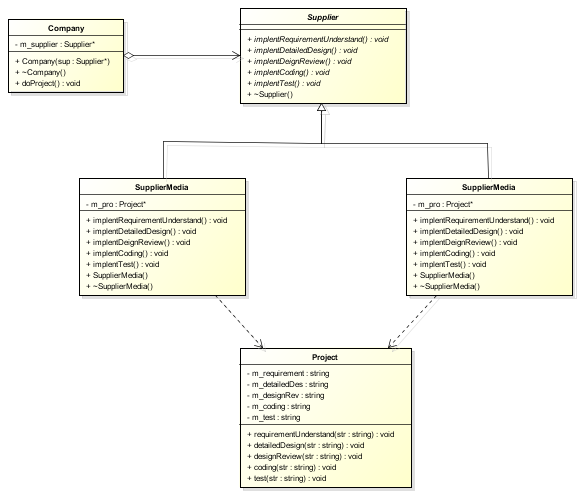建造者模式(C++)
建造者模式:将复杂的对象的表示和它的实现相分离,使其在同样的构建下可以构建不通的表示。
上面的话可能不是很明白,举个例子就明白了。假设一个公司的软件项目流程是固定的,都需要经过需求理解、需求设计、需求审核、编码、测试这个五个步骤,但是这个公司是一个一级供应商,在拿到项目后,有些模块需要承包给二级供应商,如HMI、Media两个模块需求外包出去,但是根据项目要求,所有模块(包括外包出去的模块)必须要实施需求理解、需求设计、需求审核、编码、测试这个基本步骤。
如果这个用面向对象表示出来,那我们可以这样设计,设计一个项目类,包含需求理解、需求设计、需求审核、编码、测试这5个接口;其次设计一个抽象的供应商类,提供5个实现需求理解、需求设计、需求审核、编码、测试的方法,再设计一个HMI类和一个media类,并继承自供应商类,分别实现需求理解、需求设计、需求审核、编码、测试这5方法;最后定义一个公司类,公司类里面包含一个供应商类的变量,在公司类里定义一个做项目的方法,在这个方法里分别调用供应商类的需求理解、需求设计、需求审核、编码、测试就实现了。毕竟语言有点苍白,来看看UML类图吧:

再来看看代码就更明白:
#include <iostream> #include <string> using namespace std; class Project //项目类 { public: Project():m_requirement(""), m_detailedDes(""), m_designRev(""), m_coding(""), m_test(""){} void requirementUnderstand(string str)//需求理解 { cout<<" Project requirementUnderstand()"<<endl; m_requirement = str; } void detailedDesign(string str)//详细设计 { cout<<" Project detailedDesign()"<<endl; m_detailedDes = str; } void designReview(string str)//设计核对 { cout<<" Project designReview()"<<endl; m_designRev = str; } void coding(string str) //编码 { cout<<" Project coding()"<<endl; m_designRev = str; } void test(string str) //测试 { cout<<" Project test()"<<endl; m_designRev = str; } private: string m_requirement; string m_detailedDes; string m_designRev; string m_coding; string m_test; }; class Supplier//供应商基类,即二级供应商 { public: virtual void implentRequirementUnderstand() = 0;//实现需求理解 virtual void implentDetailedDesign() = 0; //实现详细设计 virtual void implentDeignReview() = 0; //实现设计核对 virtual void implentCoding() = 0; //实现编码 virtual void implentTest() = 0; //实现测试 virtual ~Supplier(){} }; class SupplierHMI : public Supplier//HMI供应商 { public: SupplierHMI() { m_pro = new Project(); } ~SupplierHMI() { if(NULL != m_pro) { delete m_pro; m_pro = NULL; } } virtual void implentRequirementUnderstand(void) { cout<<"SupplierHMI implentRequirementUnderstand()"<<endl; m_pro->requirementUnderstand("HMI requirementUnderstand"); } virtual void implentDetailedDesign(void) { cout<<"SupplierHMI implentDetailedDesign() "<<endl; m_pro->detailedDesign("HMI detailedDesign" ); } virtual void implentDeignReview(void) { cout<<"SupplierHMI implentDeignReview()"<<endl; m_pro->designReview("HMI designReview" ); } virtual void implentCoding(void) { cout<<"SupplierHMIProject implentCoding()"<<endl; m_pro->coding("HMI coding"); } virtual void implentTest(void) { cout<<"SupplierHMI implentTest()"<<endl; m_pro->test("HMI test"); } private: Project* m_pro; }; class SupplierMedia : public Supplier//Media供应商 { public: SupplierMedia() { m_pro = new Project(); } ~SupplierMedia() { if(NULL != m_pro) { delete m_pro; m_pro = NULL; } } virtual void implentRequirementUnderstand(void) { cout<<"SupplierMedia implentRequirementUnderstand()"<<endl; m_pro->requirementUnderstand("Media requirementUnderstand"); } virtual void implentDetailedDesign(void) { cout<<"SupplierMedia implentDetailedDesign() "<<endl; m_pro->detailedDesign("Media detailedDesign"); } virtual void implentDeignReview(void) { cout<<"SupplierMedia implentDeignReview()"<<endl; m_pro->designReview("Media designReview"); } virtual void implentCoding(void) { cout<<"SupplierMedia implentCoding()"<<endl; m_pro->coding("Media coding"); } virtual void implentTest(void) { cout<<"SupplierMedia implentTest()"<<endl; m_pro->test("Media test"); } private: Project* m_pro; }; class Company//公司,即一级供应商 { private: Supplier* m_supplier; public: Company(Supplier* sup):m_supplier(sup) { } ~Company() { if(NULL != m_supplier) { delete m_supplier; m_supplier = NULL; } } void doProject()//做这个项目 { m_supplier->implentRequirementUnderstand(); m_supplier->implentDetailedDesign(); m_supplier->implentDeignReview(); m_supplier->implentCoding(); m_supplier->implentTest(); } }; int main(int argc, char** argv) { Supplier* supplier = new SupplierHMI(); Company company(supplier); company.doProject(); return 0; }
输出如下:

Do one thing at a time,and do well.



